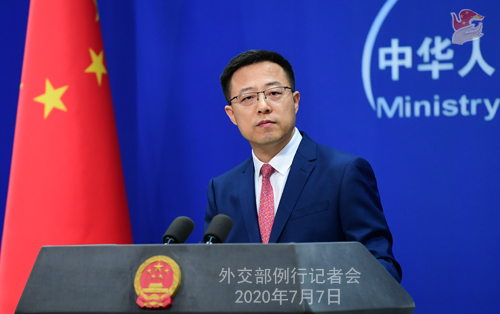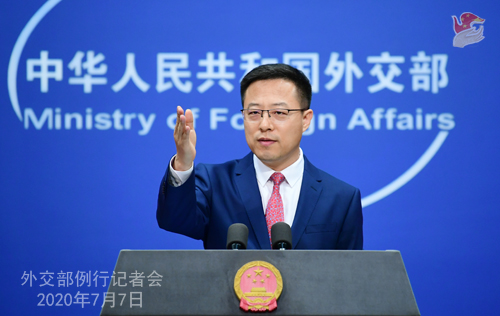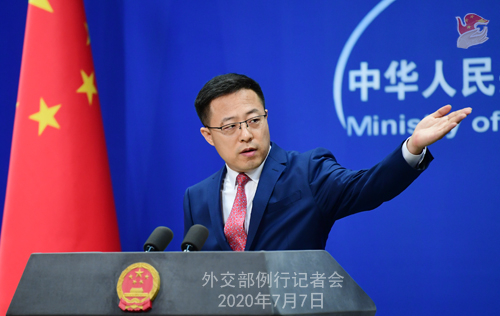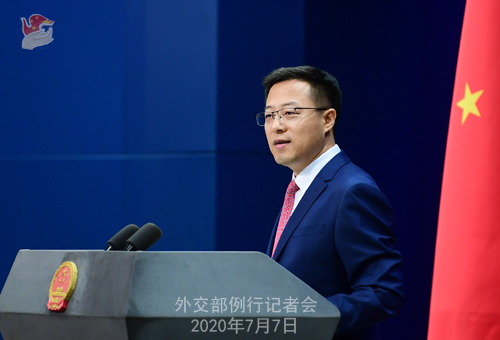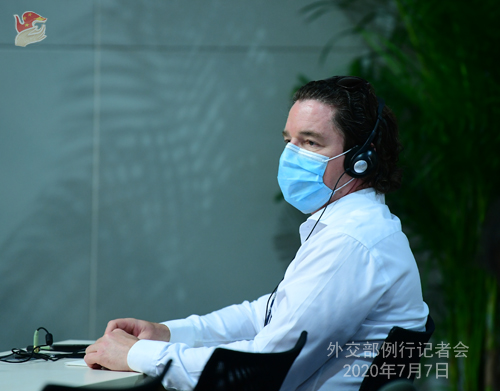| Foreign Ministry Spokesperson Zhao Lijian's Regular Press Conference on July 7, 2020 |
| 2020-07-07 21:53 |
|
CRI: The ninth ministerial meeting of the China-Arab States Cooperation Forum (CASCF) was successfully held via videolink yesterday. Faced with severe challenges brought by COVID-19 and in terms of economic recovery, China and Arab states face significant external pressure. What is China's consideration behind holding this meeting in such context? What outcomes have been achieved in China-Arab practical cooperation specifically through this meeting? Zhao Lijian: The ninth ministerial meeting of the China-Arab States Cooperation Forum was successfully held via videolink last night. President Xi Jinping sent a congratulatory letter to the meeting. State Councilor and Foreign Minister Wang Yi and Jordan's Minister of Foreign Affairs and Expatriates Ayman Safadi co-chaired the meeting and delivered keynote and concluding remarks. The meeting was addressed by the Arab League Secretary-General and foreign ministers of all the 21 AL member states. It was no easy feat to hold this meeting. As COVID-19 wreaks havoc around the world, the future of all mankind and the destinies of all countries are unprecedentedly intertwined. The advent of this pandemic affected China and all Arab states and forced the cancellation or postponement of many institutional meetings between Arab states. Despite all these, both sides made joint efforts to overcome difficulties and hold this meeting as scheduled. This meeting bears far-reaching significance as it reflects the determination of China and Arab states to fight COVID-19 and advance China-Arab strategic partnership together. After discussions, three outcome documents were reached, namely the joint statement of China and Arab states on solidarity against COVID-19, the Amman declaration of the ninth ministerial meeting of the China-Arab States Cooperation Forum, and the execution plan for 2020-2022 of the China-Arab Cooperation Forum. Through the joint statement of China and Arab states on solidarity against COVID-19, China and Arab states have gathered collective strength to fight the epidemics and tide over the difficulties together. Both sides stressed that solidarity and cooperation is the most powerful weapon for the international community to defeat the epidemics, and called for the building of a community with a shared future and a community for health between China and Arab states in the joint fight against COVID-19. Both sides underlined the importance of multilateralism, the need to further strengthen and improve the UN-centered global governance system, support the key leading role of WHO, and call on international community to strengthen coordination and form synergy, and stand against discrimination against any specific country, region, ethnic group or individual. China is ready to continue providing assistance to Arab states in fighting the epidemics. The adoption of the Amman declaration demonstrates the political will of China and Arab states to support each other and share weal and woe. At the last ministerial meeting, President Xi Jinping put forward the initiative of "jointly building a China-Arab community with a shared future for a new era", which became a bilateral consensus. The two sides agreed to hold a China-Arab summit at an appropriate time and included the topic of building a China-Arab community with a shared future into the agenda of the summit. The Arab states emphasized that they support China's position on Hong Kong-related matters, support China's efforts to safeguard national security under the framework of "one country, two systems" and oppose foreign interference in China's internal affairs. They support China's sovereignty and territorial integrity, adhere to the one-China principle and oppose "Taiwan independence" in all forms. They support China's preventive counter-terrorism measures and de-radicalization efforts. They oppose anti-China separatist activities carried out by extremist, separatist and terrorist forces. Through the execution plan for 2020-2022, China and Arab states have mapped out practical cooperation and common development in the future. The two sides have reached 107 cooperation measures in 20 areas, including politics, economy, energy, production capacity, science, technology and health.
Xinhua News Agency: Reports say Ambassador Zhang Jun recently deposited China's Instrument of Accession to the ATT to the UN Secretary General António Guterres. Could you comment on that? Zhao Lijian: On July 6, Ambassador Zhang Jun, Permanent Representative of China to the United Nations, deposited China's Instrument of Accession to the Arms Trade Treaty (ATT) to the United Nations Secretary-General António Guterres. Depositing the Instrument of Accession marks the conclusion of all legal procedures for China's accession to the Treaty. The Treaty will enter into force for China 90 days after the deposit of the Instrument of Accession on July 6. Accession to the ATT is an important step in China's active participation in global arms trade governance to safeguard international and regional peace and stability. It demonstrates China's resolve and sincerity in supporting multilateralism, maintaining international arms control regime, and forging a community with a shared future for mankind. As a country in regular arms trade, China always strictly regulates export of military articles and has put in place a full-fledged policy and legal system of export control, with policies and management measures meeting or in some areas even exceeding ATT requirements. It is worth pointing out that China only allows export to sovereign states, not non-state actors. This fully demonstrates our high sense of responsibility. China calls on all parties to strictly regulate export of military items, disallow export to non-state actors, stop interfering in sovereign nations' internal affairs through arms export, and earnestly uphold the purposes and principles of the UN Charter. As a State Party to the ATT, China is ready to strengthen communication and cooperation with all countries to enhance the treaty's efficacy and universality and improve global arms trade governance. Associated Press of Pakistan: Pakistani Prime Minister Imran Khan said in an interview that the China-Pakistan Economic Corridor would take Pakistan on the path of rapid progress and development as its economic future was related to the CPEC. What's your comment? Zhao Lijian: China appreciates Prime Minister Imran Khan's remarks. As an important pilot program under the Belt and Road Initiative, the China-Pakistan Economic Corridor follows the principle of consultation and cooperation for shared benefits and aims to promote the common development of China and Pakistan. Major progress has been made in the building of CPEC over the past six years or so, which significantly contributed to Pakistan's socioeconomic development, its people's well-being and regional connectivity. China firmly supports the development of CPEC and stands ready to work with Pakistan to fully implement the consensus reached between the leaders of the two countries, focus on cooperation on social development, livelihood, industry and agriculture while continuing advancing infrastructure construction in a bid to build CPEC into a demonstration program for the high-quality development of the BRI and bring more benefits to the two peoples.
Reuters: First, WHO said that they are sending a team to China this week to investigate the origin of the coronavirus. Can you offer details on this team's visit, like when are they expected to arrive and what's their tentative itinerary? Second, immigration authorities in the US announced a change to the student visa policy for the upcoming university semester, saying students enrolled in fully-online schools will not be able to stay in the US. What is your comment on that? Zhao Lijian: On your first question, China believes that tracing the origin of the virus is a scientific matter that should be studied by scientists and medical professionals. China and the WHO have been in close communication and cooperation on source tracing since COVID-19 broke out, and Chinese scientists have also been discussing this with scientists in other countries. China will continue supporting scientists from all countries in researching the origin and transmission routes of the coronavirus. On your second question, China is closely following the developments in the US policy. We will do our best to protect the legitimate rights and interests of Chinese students in the US. Australian Broadcasting Corporation: According to reports, in an updated travel advisory, the Australian Department of Foreign Affairs and Trade warns citizens of arbitrary detention risk in China's mainland. Do you have any comment? Zhao Lijian: I haven't read media reports on that. I can tell you that as a principle, the Chinese government always protects the safety and legitimate rights and interests of foreign nationals in China. There is no need to worry at all as long as they abide by laws and regulations. I hope the relevant side will look at this in an objective and fair manner and do more to enhance China-Australia relations. BBC: The UK's Office of Communications (Ofcom) made a finding that CGTN has been in breach of license requirements because of allegedly broadcasting confessions of Peter Humphrey. They have said there's going to be some sort of a sanction but they have not yet announced what that sanction would be on CGTN. Does the Chinese government have any response to this? Zhao Lijian: We are concerned about relevant decision made by Ofcom. This is not the first time that it makes a wrong decision against Chinese media. We firmly oppose its practice of erecting barriers for Chinese media agencies' regular reporting activities in the UK. As for the case of Peter Humphrey, I want to reiterate that China is a country ruled by law. The Chinese judicial organs handle cases in accordance with law and in this process protect the legitimate rights of foreigners in China. Peter Humphrey confessed to his crimes and showed repentance during penalty execution and was released on June 9, 2015. We again urge the relevant British office to rescind its erroneous decision and provide support and convenience for Chinese media in the UK rather than doing the opposite.
Beijing Daily: Can you give us some details on the recent trilateral meeting of COVID-19 experts among China, Japan and the ROK? Zhao Lijian: Coordinated by the China-Japan-ROK Trilateral Cooperation Secretariat and the UN Economic and Social Commission for Asia and the Pacific, China, Japan and the ROK held a trilateral video conference for COVID-19 experts on July 2. Our National Health Commission released information on that. At the meeting, experts from China, Japan, the ROK and WHO in the Western Pacific Region shared information and exchanged experience about the latest developments and epidemic containment measures. They also discussed the impact of COVID-19 on social, economic and health systems, the importance of early tests, and the efforts to strengthen technical communication. China, Japan and the ROK have been supporting and helping each other since COVID-19 broke out. Upholding the vision of a community with a shared future for mankind, China will continue engaging in close communication with Japan and the ROK to enhance epidemic-related information sharing and exchanges, jointly safeguard regional health security, and achieve the final victory against the virus. AFP: The Chinese app TikTok said yesterday that it will stop its operations in Hong Kong due to the new national security law. At the same time Secretary of State Mike Pompeo said the US is looking at banning some Chinese social media apps. I want to know if you have any comment on that? Zhao Lijian: As China stated time and again, the Law on Safeguarding National Security in the HKSAR is targeted at four categories of criminal behaviors that severely undermine national security; it protects the vast majority while punishing only a few. The Law will not in any way affect the legitimate rights and interests enjoyed by Hong Kong residents and foreign institutions and personnel in the HKSAR. Its implementation will strengthen Hong Kong's legal framework, ensure social order, improve business environment, and contribute to Hong Kong's prosperity and stability. We hope the relevant sides can view it in an impartial, objective and rational manner, exercise prudence in their words and deeds on Hong Kong-related matters, and refrain from selectively setting obstacles or even politicizing those matters.
AFP: If Facebook, Twitter or other social media posts some messages promoting Hong Kong independence from abroad, under the new national security law, would you ask them to withdraw these messages? Zhao Lijian: I don't answer hypothetical questions. BBC: Facebook, Twitter, WhatsApp, Zoom and others say they will not supply user data information to Hong Kong authorities because of the new national security law. Are they in breach of the law by not cooperating with the authorities there? Does the Chinese government have a view of this announcement from these companies? What will be the impact of the national security law on Hong Kong? Zhao Lijian: I recall what Deng Xiaoping noted in 1982 when he met with Margaret Thatcher, after Hong Kong's return to the motherland, "Horses will still run, stocks will still sizzle, and dancers will still dance" in Hong Kong. We have every reason to believe that as the Law is implemented, the foundation of "one country, two systems" will be further strengthened, the Hong Kong residents' fundamental interests and wellbeing will be better protected, the society will be more stable and harmonious, and "horses will run faster, stocks will be more sizzling, and dancers will dance more happily." We have full confidence in Hong Kong's future. As for your question, I believe time will tell. BBC: Do you have a specific response to the comments from the US Secretary of State that the removal of certain books from libraries in Hong Kong was an Orwellian move by the Hong Kong authorities? Zhao Lijian: I refuted this politician's comments multiple times last week. I don't want to waste our time on him again today. BBC: A question on the BNO passports. The British government said there may be a path to citizenship for BNO passport holders, and the Chinese ambassador to the UK responded to that. I'm wondering if you have any comments? Zhao Lijian: The Chinese embassy in the UK has responded to it in detail. I also made clear China's position on this several times last week. According to media reports, there are more than three million Chinese citizens who are BNO passport holders or can apply for BNO passports. It would be wise for the UK gove rnment to think carefully before having all those people in the UK and giving them the same benefits as those enjoyed by British citizens, such as job opportunities, health care and welfare. Before making the final decision, the British government had better solicit opinions from its people and get a grasp on their reaction to this. |
| |||||||||||||||
|
|||||||||||||||


